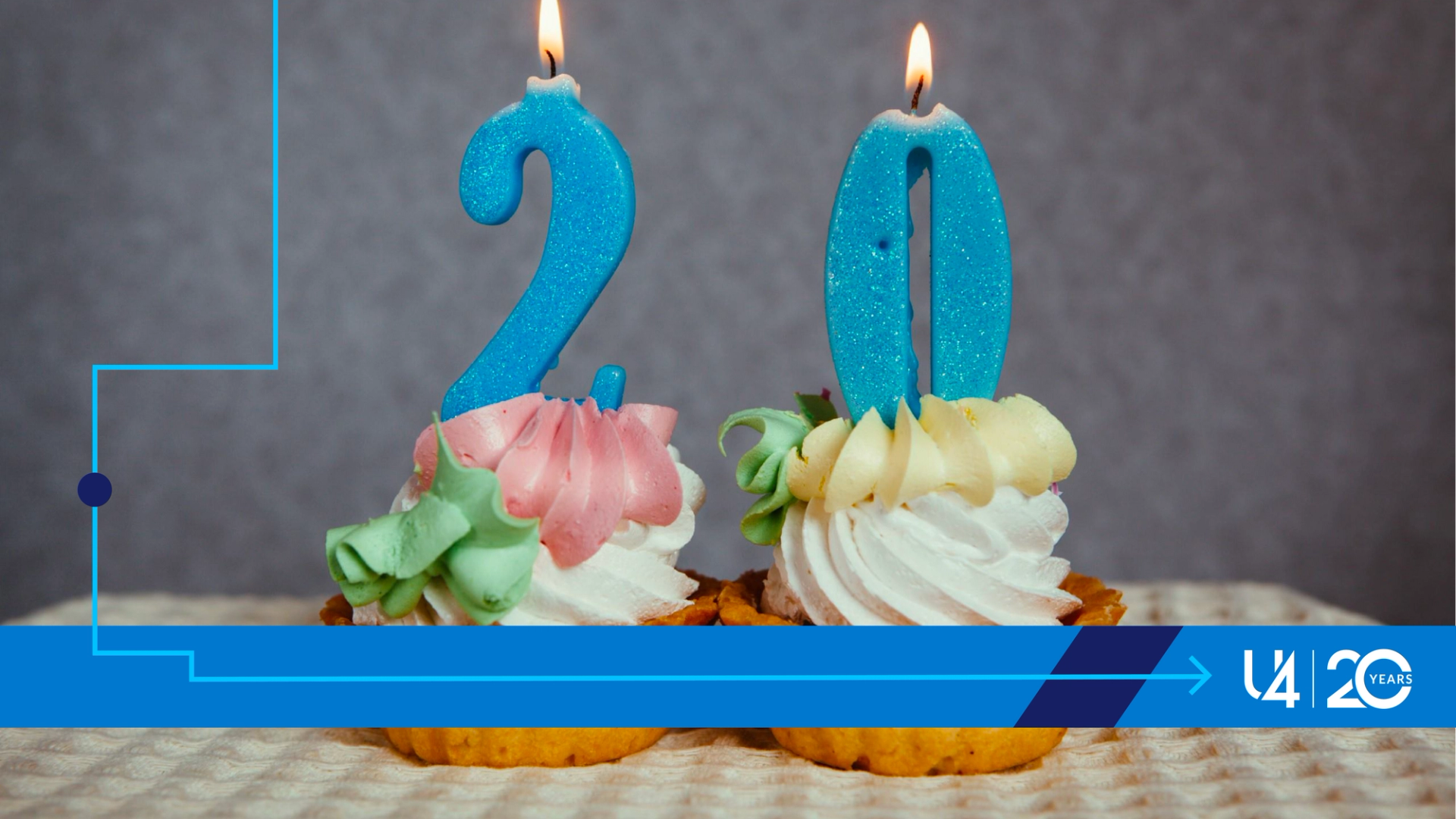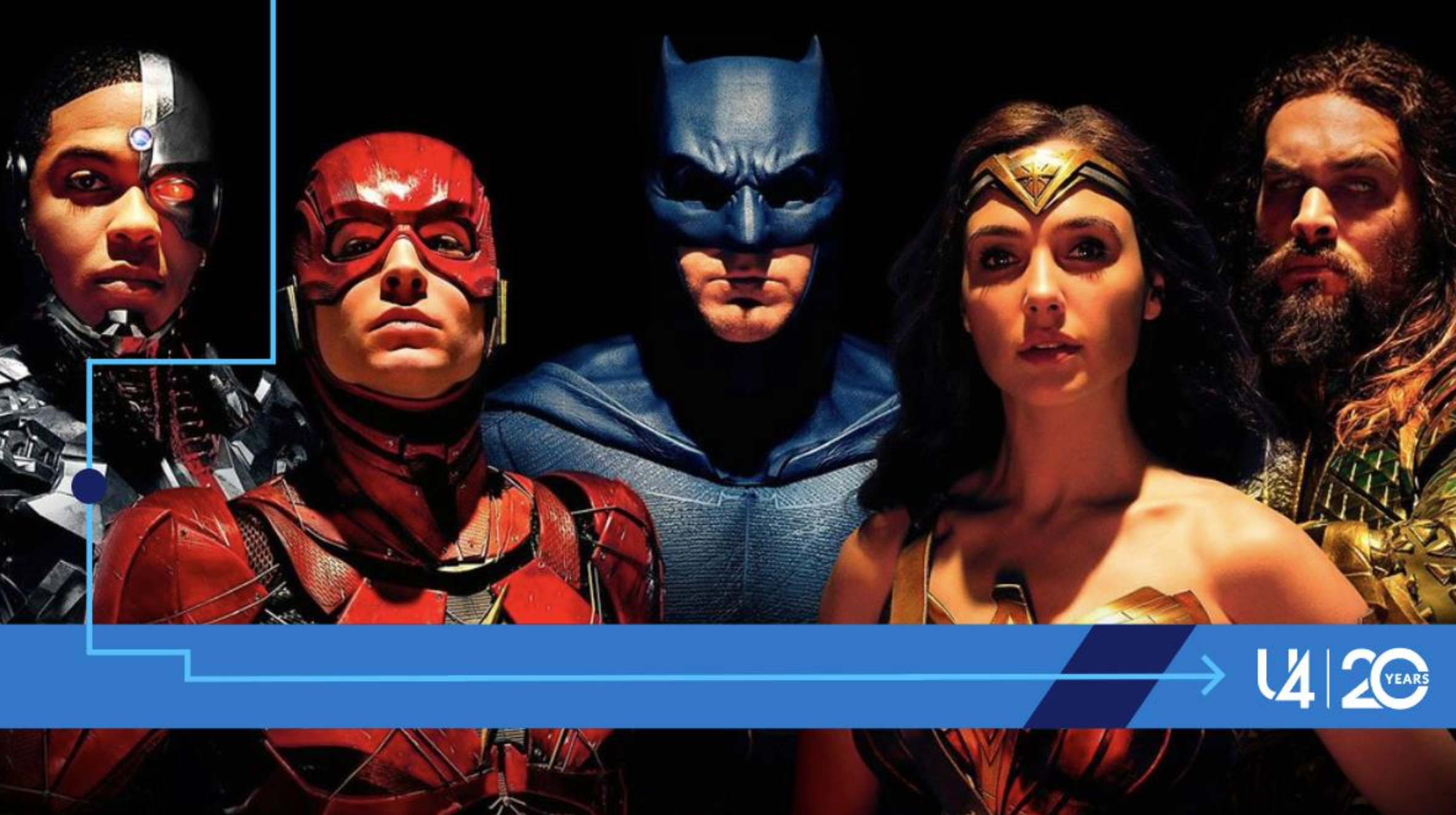Blog
U4 at 20: A quiet birthday at home with friends (across the world)

Anniversary blog series
U4 staff and friends celebrate U4’s 20th anniversary with a blog series reflecting on developments and lessons learned in a world of ever evolving corruption challenges:
- U4 at 20: A quiet birthday at home with friends (across the world) – Peter Evans
- Specialised anti-corruption institutions: Measuring their performance and managing our expectations – Sofie Schütte
- The role of technology in anti-corruption: Dystopian reflections – Daniel Sejerøe Hausenkamph
- Strategic litigation and its untapped potential for anti-corruption – Sophie Lemaître
- The anti-corruption community should become more ‘tribal’ – David Jackson
- Corruption risk management in the aid sector: past, present, and the path ahead – Guillaume Nicaise
- Corruption is unaffordable for Latin America’s resurgent left: Democracy and lives are at stake – Aled Williams and Daniela Cepada Cuadrado
- Corruption is absent from the UN ‘World of Debt’ report – Daniela Cepada Cuadrado
- Anti-corruption games: Learning how to face corruption challenges – Guillaume Nicaise and Rachael Tufft
- a) Gender and corruption: What we’ve learned from 20 years of research (Part 1) – Ortrun Merkle and Ina Kubbe
b) Gender and corruption: Charting the course for the next 20 years (Part 2) – Ortrun Merkle and Ina Kubbe
And other blogs to come throughout 2023!
Sign up to the U4 Newsletter to get updates, or follow us on Twitter, Linkedin and Facebook.
U4: Helping our friends
In the aftermath of Russia’s full invasion of Ukraine, U4 worked hard to support brave anti-corruption partners in Ukraine, and international organisations delivering urgent aid, and planning major support for recovery and reconstruction. We built on earlier U4 work and networks in Ukraine, and rapidly made new friends. We have learned a lot – and hope that we are helping our international partners.
Of course, Ukraine is just one part of our work. We began the 20th anniversary year with a full workload: gender, corruption risk management, health, COVID-19, civil society, natural resources, climate change, the justice sector, conflict and fragility, illicit financial flows, and other projects. Ukraine was added to these existing themes.
But with this backdrop, it did not seem right to stop and celebrate a birthday. Instead, we aimed to mark ‘U4 @20’ with deeds, not words. And we postponed the 20th birthday plans until 2023. This was the right decision, and also apt for U4’s personality – an organisation that is about ‘doing and helping’, rather than ‘blowing our own trumpet’.
Friends willing to pay for anti-corruption
Anti-corruption work relies on assured and dependable funding. U4 is supported by our eight government partners from their aid budgets, and ultimately from their tax-payers’ pockets. So, thank you to all our friends in Norway, Sweden, Germany, Denmark, Finland, Canada, UK, Switzerland.
U4’s ‘new’ old friends
I have been U4 Director since December 2021. I am often awed when strangers get in touch to say how they have long depended on U4. These are the ‘old friends that we did not know we had’. In fact, I used to be one of them – a quiet user of U4’s website when I worked in international development, public policy, and social and political research.
It is humbling when these old friends get in touch – either online, or face to face at events such as the U4 ‘in country’ workshops, at the International Anti-Corruption Conference (IACC) – to tell us how much they value U4’s great depth of expertise, resources, and advice. They seek us out because of our trusted reputation, and they see the U4 ‘brand’ as representing honest information about corruption – and how to tackle it. Reliability is clearly an important ‘unique selling point’ for us, and something that we work hard to sustain.
Our old friends are diverse: in the last few months, they have included well-known names at global organisations, philanthropic foundations, staff at national non-governmental organisations and activists – from four continents.
U4: A trusted source
Our good friends tend to say similar things – ‘you are our first port of call for trustworthy information about corruption’ and our website is now a vast repository of useful resources covering work spanning 20 years.
Most of our website traffic comes from people searching online for ‘anti-corruption’. This helps explain some surprises in our website traffic. In 2022, our most-read articles included a 2021 piece on ‘zombie’ statistics in anti-corruption that got a new burst of attention when President Biden quoted one of these, and a paper on anti corruption in the Philippines which generated a big spike in audience from that country … 13% of all website sessions!(The other countries in the top five were USA, South Africa, India and Pakistan).
My personal blog about anti-corruption ‘porridge’ attracted love and hate. My colleague’s blog on corruption risks and multilateral partners earned me some stern feedback in the coffee queue at the IACC. But I love this interaction – and feedback is always a gift, whether positive or negative. As Oscar Wilde said: “There is only one thing in the world worse than being talked about, and that is not being talked about.”
Tough love: Hurt friends but influence people
Yes, critical friends are a long-term benefit, even if they spoil a party. After 25 years in anti-corruption, I have often seen disappointment, false hope and premature celebration. I have tried some worthy ‘solutions’ that matched our values and beliefs, but the world had other plans. Many gadgets and gizmos have been lauded as ‘anti-corruption gold’, yet many have failed to deliver.
Corruption is hard to pin down, and keeps evolving – because so much loot is at stake. Anti-corruption practice is still quite a new ‘science’; many common interventions are relatively untested, or unproven, and we need to keep up the critically assessment. Testing, testing, testing. And we need critical friends to tell us when to stop.
At U4 we support our donor partners, but defend our independence. And we ourselves are critical friends who tell people if we think that what they are doing does not work. With my background in public health (urban malaria control in Tanzania), I enjoy the discipline of evidence-informed public policy and questions such as: ‘what is the evidence that this is effective?’ At U4, we work with passionate practitioners who are committed to their work, who may have set up anti-corruption initiatives in risky environments, and even faced personal attacks. But we owe these friends our honesty and truth, even if this feels like ‘tough love’.
A birthday tip: test your anti-corruption messaging before launch…
Over 20 years, one anti-corruption initiative that I have seen time and time again, even when funds are limited, is the quick public information campaign – using newspaper advertisements, billboards, and TV slots. Governments and donors seem to love them, and why not? What could possibly go wrong? Well, I hate to break it to you friends, but many things.
Over the last few years, Caryn Peiffer and Nic Cheeseman, and colleagues have tested some common anti-corruption messages in a variety of different settings (Nigeria, Papua New Guinea, Albania) and measured what actually happens. They found that messaging can backfire, and even make individuals more likely to engage in corruption, such as paying a bribe.
At the UNCAC COSP in September, a number of country governments mentioned plans to launch new public information campaigns, so we were keen to pull existing research together into an accessible summary for policy makers to (hopefully) read and reflect on, before instigating yet more campaigns. Peiffer and Cheeseman’s U4 Brief Message Misunderstood: Why raising awareness of corruption can backfire is a sobering read.
Yours sincerely, with honesty!
Your friends at U4
Disclaimer
All views in this text are the author(s)’, and may differ from the U4 partner agencies’ policies.
This work is licenced under a Creative Commons Attribution-NonCommercial-NoDerivatives 4.0 International licence (CC BY-NC-ND 4.0)
